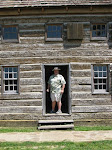 Yes, you could say that I am a product of a required culture. When I was in elementary school in a mill town in Western Maryland, all the students attended a Thanksgiving service at the nearby Presbyterian church, and on class time. My town had a large number of Catholics, some Jews, and probably a few non-believers, not to mention what today would be called satanists, tree-huggers and worse. In the three years we made that trek for Thanksgiving, there was no word of dissent. It was a common experience, and one that I'd like to think was driven by more than our fear of Miss Dowling and her paddle. There were plenty of other cultural requirements throughout my schooling, ranging from playing a musical instrument to attending two years of ROTC at the state's flagship public university. I hadn't planned on it, but I got a liberal education. Sad to say that's no longer the case, not even in public high school. Given the state of Western civilization, a bit of repair on the common culture would be in order. Unfortunately, any large-scale restoration seems highly unlikely. None of us has time to mourn the loss. Keeping a hand on the tiller and sheet is difficult enough these days, even in a small lake.
Yes, you could say that I am a product of a required culture. When I was in elementary school in a mill town in Western Maryland, all the students attended a Thanksgiving service at the nearby Presbyterian church, and on class time. My town had a large number of Catholics, some Jews, and probably a few non-believers, not to mention what today would be called satanists, tree-huggers and worse. In the three years we made that trek for Thanksgiving, there was no word of dissent. It was a common experience, and one that I'd like to think was driven by more than our fear of Miss Dowling and her paddle. There were plenty of other cultural requirements throughout my schooling, ranging from playing a musical instrument to attending two years of ROTC at the state's flagship public university. I hadn't planned on it, but I got a liberal education. Sad to say that's no longer the case, not even in public high school. Given the state of Western civilization, a bit of repair on the common culture would be in order. Unfortunately, any large-scale restoration seems highly unlikely. None of us has time to mourn the loss. Keeping a hand on the tiller and sheet is difficult enough these days, even in a small lake.This topic has been on my mind for several weeks. I chose to write a bit about it today because John Derbyshire referenced it in The Corner at National Review Online. What I didn't expect was finding that most able arts critic, Terry Teachout, at the link. Teachout - blogging at About Last Night - is to the fine arts what Tom Wolfe is to the novel; that is, remarkably observant, readable, and relevant. Derbyshire's sharp as well.

No comments:
Post a Comment